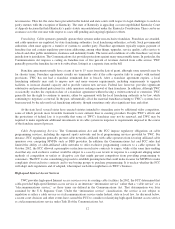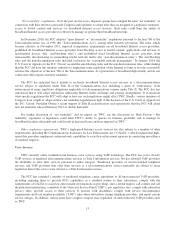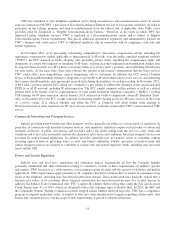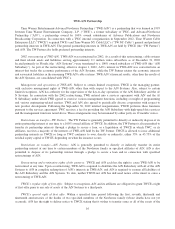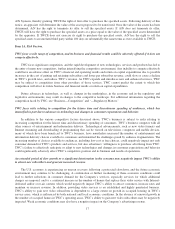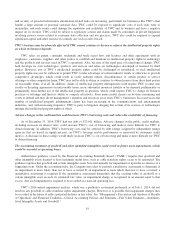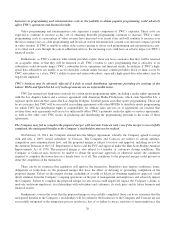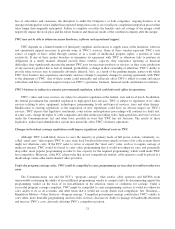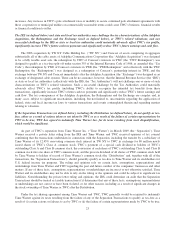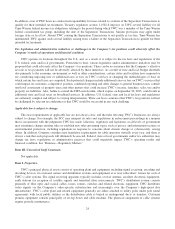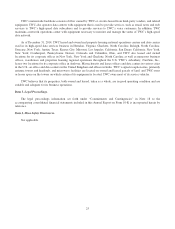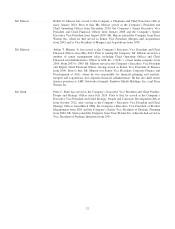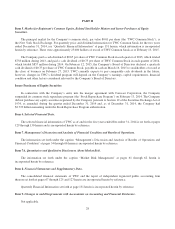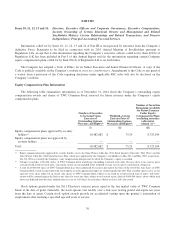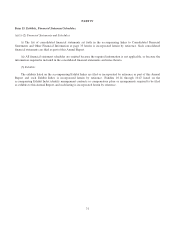Time Warner Cable 2014 Annual Report Download - page 30
Download and view the complete annual report
Please find page 30 of the 2014 Time Warner Cable annual report below. You can navigate through the pages in the report by either clicking on the pages listed below, or by using the keyword search tool below to find specific information within the annual report.“Net neutrality” regulation or legislation could limit TWC’s ability to operate its business profitably and to manage its
broadband facilities efficiently and could result in increased taxes and fees imposed on TWC.
The increasing popularity of bandwidth-intensive Internet-based services has increased the demand for and usage of
TWC’s high-speed data service. In order to continue to provide quality high-speed data service at attractive prices and to
offer new services, TWC needs the continued flexibility to develop and refine business models that respond to changing
consumer uses and demands, to manage bandwidth usage efficiently and to continue to invest in its systems. TWC’s
ability to do these things could be restricted by regulatory or legislative efforts to impose so-called “net-neutrality” or
“Open Internet” requirements on broadband Internet access service providers.
Proponents of increased “net neutrality” regulation have called for the FCC to regulate broadband Internet access
services as telecommunications services under Title II of the Communications Act, and the FCC has indicated that it
intends to adopt the Title II regulatory approach. Reclassification of broadband Internet access services under Title II
could subject such services to significant new regulation, including rate regulation, although the FCC has indicated that it
intends to forbear, at least to some extent, from regulating broadband rates. FCC action is expected in February 2015 or
shortly thereafter. In addition, various members of Congress have proposed to enact legislation banning the blocking of
Internet traffic and imposing non-discrimination requirements on broadband Internet access providers, such as TWC. Such
regulation or legislation could adversely impact TWC’s ability to operate its high-speed data network profitably and to
undertake the upgrades and put into operation management practices that may be needed to continue to provide high
quality high-speed data services and new services and could negatively impact TWC’s ability to compete effectively.
Furthermore, such regulation or legislation could increase the taxes and fees imposed on TWC and its broadband services,
particularly if the FCC does not forbear imposition of Federal Universal Service Fees on broadband or if Congress does
not extend the Internet Tax Freedom Act (“ITFA”) moratorium. See “Business—Regulatory Matters—High-speed
Internet Access Services—‘Net neutrality’ regulations.”
Rate regulation could materially adversely impact TWC’s operations, business, financial results or financial condition.
Under current FCC regulations, rates for BST video service and associated equipment are permitted to be regulated.
In approximately 85% of the communities it serves, TWC is not subject to BST video rate regulation, either because the
local franchising authority has not asked the FCC for permission to regulate rates or because the FCC has found that there
is “effective competition.” Also, there is currently no federal rate regulation for TWC’s other services, including high-
speed data and voice services. However, as noted above, reclassification of broadband Internet access services under Title
II of the Communications Act could subject such services to rate regulation. Should the FCC or Congress adopt more
extensive rate regulation for TWC’s video services or regulate the rates of other services, such as high-speed data and
voice services, which could impede TWC’s ability to raise rates, or require rate reductions, such regulation could cause
TWC’s business, financial results or financial condition to suffer.
TWC may encounter substantially increased pole attachment costs.
Under federal law, TWC has the right to attach cables carrying video and other services to telephone and similar
poles of investor-owned utilities at regulated rates. However, because these cables may carry services other than video
services, such as high-speed data services or new forms of voice services, some utility pole owners have sought to impose
the telecommunications rate on TWC when it carries services other than video services over its attachments. The
appropriate method for calculating pole attachment rates for cable operators that provide VoIP services remains unclear.
In addition, it is unclear whether the expected reclassification of broadband Internet access services under Title II of the
Communications Act could impact the rate TWC is required to pay for its attachments. In January 2014, the FCC sought
comment on a petition regarding the legal classification of VoIP services for purposes of assessing pole attachment rates,
and the petition is still pending.
Some of the poles TWC uses are exempt from federal regulation because they are owned by utility cooperatives and
municipal entities. These entities may not renew TWC’s existing agreements when they expire, and they may require
TWC to pay substantially increased fees. A number of these entities are currently seeking to impose substantial rate
22


